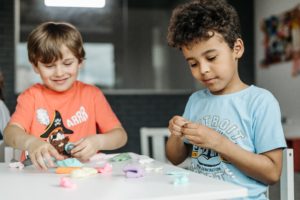How can I help my child with their social skills?
What are social skills?
 Social skills are the skills we use everyday to interact and communicate with others. They include verbal and non-verbal communication, such as speech, gesture, facial expression and body language. Social skills are important to engage in positive everyday interactions with others. They also help to develop and maintain friendships.
Social skills are the skills we use everyday to interact and communicate with others. They include verbal and non-verbal communication, such as speech, gesture, facial expression and body language. Social skills are important to engage in positive everyday interactions with others. They also help to develop and maintain friendships.
What are some examples of poor social skills?
- Difficulty turn taking
- Difficulty with body language (e.g. standing too far or too close to another person)
- Difficulty sharing the conversation equally
- Not asking appropriate questions
- Difficulty understanding jokes or following conversations
- Difficulty talking about non-preferred topics
- Difficulty recognising other’s emotions
- Difficulty with eye contact
What can be done to improve my child’s social skills?
There are a number of ways to help your child develop their social skills. Some of these include:
 1. Play
1. Play
Play with your child to help develop joint attention, turn taking, problem solving, and collaborative play. Playing with others means noticing social cues, listening, and taking another person’s perspective. Social play also requires children to share ideas and express feelings while negotiating and reaching compromises.
2. Visuals
Use visuals to remind your child of key facts to remember e.g. when engaging in a conversation remember eye contact, body language, share the conversation, ask questions. Other visuals such as watching videos can help to consolidate social skill concepts.
 3. Social stories
3. Social stories
Social stories are used to teach children specific social skill concepts. They can use photographs and descriptive words to guide children through real-life situations to help understand expected behaviours, practice problem solving skills and help them understand new perspectives.
4. Role play
Role play is a great way to practice various social scenarios. This can help to develop problem solving behaviours. Some example scenarios could be; attempting to make a new friend and negotiating with a peer to compromise. During a role play, you are able to present appropriate and inappropriate reactions, behaviours and responses and discuss how each one may make their peers feel.
5. Social groups
Social groups are used to teach social skill concepts to children with similar age peers. This gives children a chance to practice learnt skills with their peers in a structured environment. Here at Cooee, we run a number of social skills groups for children of various ages. If you are interested in social skills groups for your child, please call or email our friendly client care team on 07 3265 4495 or [email protected]. They would love to be able to support you with information about our social skills groups and how you can register your interest.

Georgia West
Speech Pathologist
